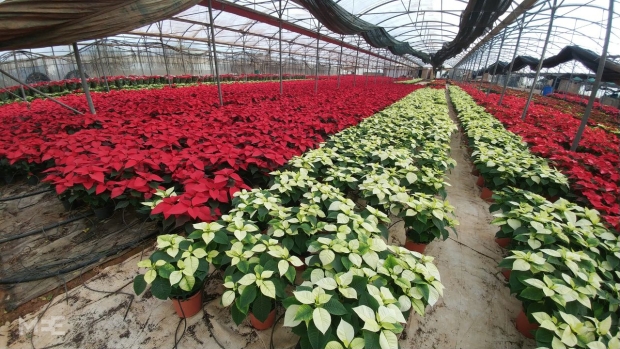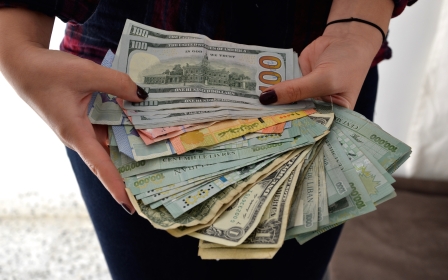Lebanese Christmas traditions symbolise solidarity and rebirth

ZGHARTA, Lebanon - Pride is beaming in Zgharta, a town in northern Lebanon. According to the Huffington Post, their Christmas tree is one of the most impressive in the world.
Though it is not a real tree, their Christmas interpretation of pines and needles certainly demonstrates creativity.
“Our tree is 25 metres high and 13 metres wide. This year we chose to work around the theme of Father Christmas’s workshop, so we put all the characters such as deer, leprechauns and snowmen around the tree,” says Evelyna Mouhawess, communication manager at Midan, the local association in charge of the tree.
Keeping old traditions alive
In Zgharta, Christmas trees stand for more than just folklore. They promote a positive image of Lebanon.
“Even if we live in a difficult region, we want to show that Lebanon is not just about war. Here in the north we have many different religions, yet we live together. The tree symbolises our capacity to celebrate one another’s special occassions,” she adds.
During the Christmas season, free activities like concerts and plays are organised around the tree, where Lebanese people from all backgrounds meet and mingle.
In a traditional stone house at the centre of town, the Makary family is preparing for Christmas. Although most of the family lives two hours away in Beirut, grandparents, sons and grandchildren gather to decorate their family tree.
“We are going to put up colourful garlands and lights on the balconies, along the staircase and on the windows. We will also put a Christmas crib under the tree,” says aunt Marguerite Makary, who is 87 years old.
“The village kids also celebrated Saint Barbara. On 3 December, they put on makeup, colourful costumes, started singing and went around knocking on all the doors in the local neighbourhood asking for money. I gave them a little. Then, they gather and bring the money to the Church,” she recalls.
On the night of Saint Barbara, some Christian villages also follow a special custom whereby the whole family joins together to plant seeds in a piece of cotton. Then by 24 December, the young shoots will be ready and placed in the Christmas crib as a symbol of life.
Poinsettia passion
In Lebanon, the month of December is associated with the colourful red-leafed Poinsetta plant. The Lebanese love to buy them in large quantities to decorate houses, shops and streets.
“Poinsettia is really the Christmas plant here. People like to offer them as gifts or place them around the house to give a joyful atmosphere,” says Alaa Rachanié, a flower shop owner in Beirut.
Rachanié gets the baby poinsettias from Holland and then grows them in a greenhouse outside of town. “I sell a lot of them during the winter season. It’s actually one of the plants I sell the most all year, even though it’s very seasonal. I take a 20 percent margin on each flower pot, so it represents a big chunk of my yearly income,” he says.
At his shop, poinsettia pots are sold for between five and 25 dollars, depending on the size.
Lebanese cooking at its best
The Lebanese also have their special cooking traditions. In the district of Mar Mikhael, Kamal Mouzawak runs Tawlet, a network of restaurants where village women come to cook their local dishes.
“For Christmas, you have to distinguish between rural and urban traditions. In the old days, village people were rather poor and tended to eat vegetarian meals. Celebration days were an occasion to cook meat but not as a main portion of the meal. Instead the idea was to spread it over rice or crushed wheat (burghol) in order to better share it. In cities dishes were of course, more fancy and included more meat.”
After the main course, the Lebanese usually eat meghlé, a cinnamon desert prepared to celebrate new-borns, and on Christmas, the birth of Jesus.
“The recipe includes rice, water, sugar, cinnamon, caraway and anise. Together they form a brown sweet cream on top of which we place almonds and pistachios. It is a symbol of rebirth because the desert looks brown and we place seeds on it,” adds Mouzawak.
Solidarity with refugees
Lebanon is home to over a million Syrian refugees. Even though a vast majority of them are Sunni Muslims, Christmas is nevertheless a time to demonstrate solidarity.
Most Syrian refugees live in the Bekaa Valley. In 2012, over 650 Christian Syrian families arrived there, in the town of Zahlé.
Basman, his wife Rania and their three kids were part of the group. This year is the first time since they have been living in exile that they will celebrate Christmas.
“We put about 100 dollars to the side to buy decorations and a few gifts for the children, but my daughter and I fell sick last week so we spent all our money on medication,” says Basman.
Their party was going to get cancelled, but a Lebanese neighbour offered to buy them a tree and save Christmas.
“People here are very nice to us,” says Rania. “I decorated the tree with the children and we listened to Christmas carols while doing it to better get in the Christmas spirit.”
For other families, however, 24 December will be a regular night.
“The first year we were here, we still had money, so we bought a tree and had a party, but now we can’t do that anymore. In Syria, we used to organise great gatherings, but to celebrate you have to be happy and we are no longer happy,” says Yasser, another refugee who came from Qussayr in 2012 with his wife and three sons.
When he recalls those memories, his eyes tear up. He remembers his neighbours who were killed, his burned house and his wife’s devastated store.
“We lost everything we had. Here life is much more expensive and it’s difficult to find work. The Lebanese are welcoming, but we know that in the end, we remain foreigners,” he says, before adding that he wishes to go back to Syria as soon as possible.
Samira is a retired Lebanese woman. She lives in the house next door and likes to come and have coffee with Yasser and his wife every day.
“I like spending time with them, they are good people,” she says. “This year, I might come and spend Christmas with them for a change.”
In Zahlé, a lot of Christian refugees do not get aid from the United Nations as their humanitarian situation is not considered a priority compared to that of the refugees living in the camps. In the absence of international aid, it is the local church that helps them.
“Christian Syrian refugees came to us at the beginning of the war. Following the battle of Qussayr, about 800 families came to Zahlé. They were asking for help. We did it. It is our role to alleviate their pain,” says Issam John Darwish, the Greek Melkite Catholic Archbishop of Furzol, Zahlé and the Bekaa.
The church helps Syrian families find houses, pay for their rent and daily expenses, and tutor children who have difficulties adapting to the Lebanese curriculum. They also provide medical care through the archbishop’s hospital and have recently opened a restaurant that serves up to 600 meals a day.
The church also supports families at Christmas time. “We try to bring joy into people’s hearts by organising activities where Syrians and Lebanese can mix. We also distribute toys and sweets to the kids,” adds Darwish.
At Christmas time, Lebanese NGOs such as Kahwit al-Frani, Sawa for Development and Aid, or Basmeh & Zeitoune also distribute help to refugees regardless of their religion.
This article is available in French on Middle East Eye French edition.
Stay informed with MEE's newsletters
Sign up to get the latest alerts, insights and analysis, starting with Turkey Unpacked
Middle East Eye delivers independent and unrivalled coverage and analysis of the Middle East, North Africa and beyond. To learn more about republishing this content and the associated fees, please fill out this form. More about MEE can be found here.








